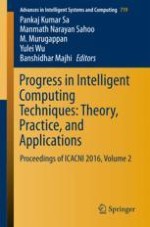2018 | OriginalPaper | Buchkapitel
A Proposed What-Why-How (WWH) Learning Model for Students and Strengthening Learning Skills Through Computational Thinking
verfasst von : Rakesh Mohanty, Sudhansu Bala Das
Erschienen in: Progress in Intelligent Computing Techniques: Theory, Practice, and Applications
Verlag: Springer Singapore
Aktivieren Sie unsere intelligente Suche, um passende Fachinhalte oder Patente zu finden.
Wählen Sie Textabschnitte aus um mit Künstlicher Intelligenz passenden Patente zu finden. powered by
Markieren Sie Textabschnitte, um KI-gestützt weitere passende Inhalte zu finden. powered by
